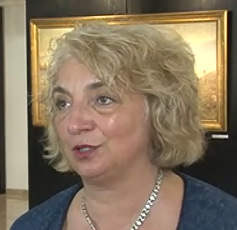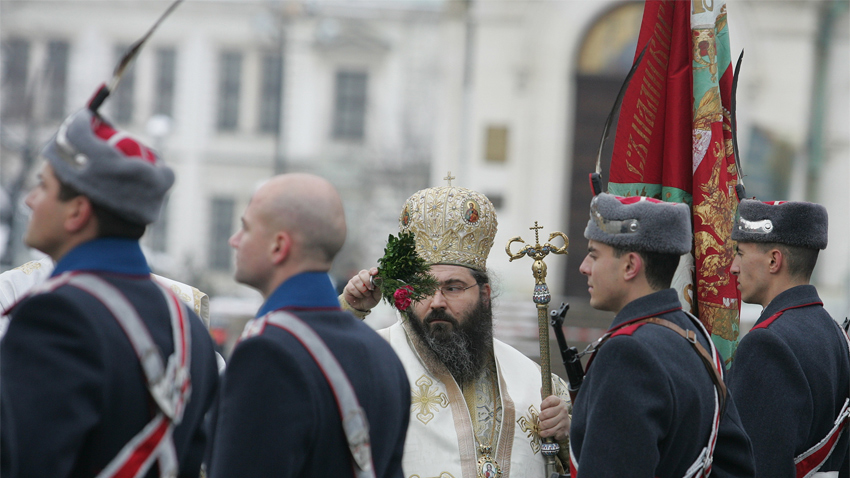The Bulgarians see the battle flag as one of the major symbols of national integrity, related to the memory of the thousands of warriors who gave their life for the motherland. The flag is still an essential sign of honor and dignity. January 6th – Epiphany is the day when Sofia traditionally hosts the solemn water blessing ceremony of the Bulgarian army’s sacred flags.
The church canon says that the battle flag is sanctified only once, at its handing over to the regiment and on Epiphany the banners are blessed too. According to the Christian tradition the Epiphany water has the power to exterminate evil, washing away what’s old and bringing new life and new beginning. The battle flagsblessing tradition on this day was born yet in 917, when the flags were blessed in the waters of the Yantra River prior to the Aheloy battle, where Tsar Simeon I delivered a devastating blow to the Byzantine army. The ritual was kept up until the fall under Ottoman rule and after the Liberation the tradition was restored by Bulgaria’s first Defense Minister Parensov. It was again kept till 1946 and the start of the communist era. After the end of the totalitarian regime the  tradition was restored and has been kept for 25 years now. ‘The highest church representative within the eparchy prays for and blesses with holy water the local representative units of the Bulgarian army and its battle flags,’ says Doctor of Historical Science and Deputy Director of the National Museum of Military History Daniela Gancheva and adds:‘The significance of the flag was formed yet in ancient times and the oldest data on a Bulgarian flag belonged to the era of Prince Boris I. In his 866 correspondence with Pope Nicholas I he mentioned that the proto-Bulgarians used to carry horses’ tails as their flag. Then the Pope replied that after their baptizing the Bulgarians had to have a flag with a cross on it. Today we don’t know the actual outlook of the flag, but we can tell for sure that the Bulgarians had flags yet during the reign of Tsar Kaloyan of Bulgaria /1197 – 1207/. We are aware of the historical fact that during the battle of Klokotnitsa /9 March 1230/ Tsar Ivan Asen had ordered the contract, violated by Theodore Komnenos Doukas, to be attached to the battle flag.
tradition was restored and has been kept for 25 years now. ‘The highest church representative within the eparchy prays for and blesses with holy water the local representative units of the Bulgarian army and its battle flags,’ says Doctor of Historical Science and Deputy Director of the National Museum of Military History Daniela Gancheva and adds:‘The significance of the flag was formed yet in ancient times and the oldest data on a Bulgarian flag belonged to the era of Prince Boris I. In his 866 correspondence with Pope Nicholas I he mentioned that the proto-Bulgarians used to carry horses’ tails as their flag. Then the Pope replied that after their baptizing the Bulgarians had to have a flag with a cross on it. Today we don’t know the actual outlook of the flag, but we can tell for sure that the Bulgarians had flags yet during the reign of Tsar Kaloyan of Bulgaria /1197 – 1207/. We are aware of the historical fact that during the battle of Klokotnitsa /9 March 1230/ Tsar Ivan Asen had ordered the contract, violated by Theodore Komnenos Doukas, to be attached to the battle flag.

According to Dr. Gancheva the statute of each regiment reads that in case the battle flag is lost, the formation is to be disbanded. ‘That is why the Bulgarian warrior has always fought the most about his own flag, preventing its capturing,’ Daniela Gancheva goes on to say:
‘The flag is a major and fundamental thing within each regiment. Our museum dares to confirm that no Bulgarian flag has ever been captured. We all know that during the Great War and after the Armistice of Salonica in the end of September 1918 over 100,000 Bulgarian warriors remained in captivity. The French command tried to take the flags of the captured regiments, but the Bulgarian officers and soldiers didn’t let them do that and saved all of the banners and flags. In the course of 9 months and while forced to manual labor, many of the warriors hid the flags under their jackets, thus preserving them. When they were released, the Bulgarians returned home and brought back the flags with them. That was really heroic, as death was the punishment in case of detection. The flags in our museum have still preserved the seam traces from the soldiers’ jackets.’
English version: Zhivko Stanchev
Photos: BGNESThe Feast of the Epiphany - the entry of the Theotokos into the Temple - is one of the oldest and most revered feasts in the Orthodox world. It was introduced in Constantinople around the 8th century during the time of Patriarch Tarasius. It was six..
The Museum of the Jewish People in Tel Aviv , Israel, today commemorates the 130th anniversary of the birth of Dimitar Peshev, a righteous man of the nations of the world, deputy chairman of the 25th National Assembly of Bulgaria, the Bulgarian..
The Bulgarian Land Forces are celebrating their holiday today. A statement from the Ministry of Defense's press center notes that November 19, 2024 marks 139 years since the glorious victory at Slivnitsa and 146 years since the establishment of..
Today, the Bulgarian Orthodox Church commemorates St. Naum of Ohrid. Naum was a medieval Bulgarian scholar and writer. He was born around 830 and..
The first modern Christmas was celebrated in Bulgaria in 1879. It followed a European model with a Christmas tree, ice skating and gifts. At that..

+359 2 9336 661
